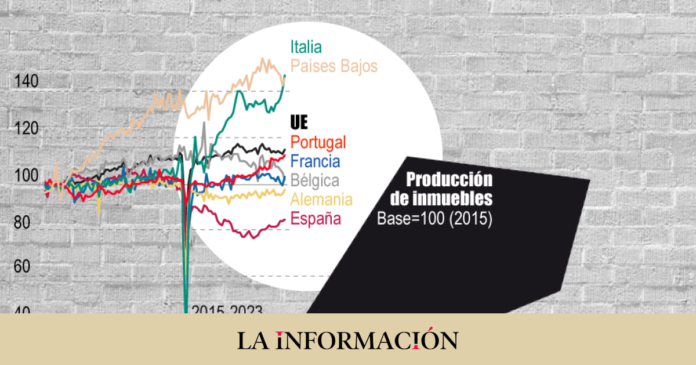The aftermath of the 2008 real estate crisis is still present, although more than 15 years have passed. Spain is the large market in the European Union that has recovered its pre-pandemic property production the worst and still remains 15.1% below the levels recorded in 2015, while countries such as Germany, France or Portugal are ranked first. above these values despite the abrupt declines of the pandemic. The Spanish anomaly in the production of real estate – in which the vast majority are residential – causes a paradox: housing prices continue to increase despite the fact that this year the volume of transactions has decreased by around 10%, it concludes Antonio de la Fuente, General Director of Corporate Finance at Colliers.
In 2006, Spain produced some 760,000 homes, more than those started by Germany, Italy, France and the United Kingdom combined. Since then, construction has largely failed to reach similar building levels and the average number of homes completed between 2009 and 2022 was 110,093 buildings, according to data from the Construction Labor Foundation Observatory.
Although production has not taken off, demand for houses continues to increase. The National Institute of Statistics (INE) estimates that 2.7 million homes will be formed by 2037 – at a rate of about 180,000 homes per year – which, added to the low production, will cause a severe gap between demand and supply. which will impact the price if not resolved.
A hangover of more than 15 years.
Spain still has the hangover from the crisis. José García Montalvo, professor of Applied Economics at the Pompeu Fabra University of Barcelona, explains that it is the only country on the continent, along with the United Kingdom, in which these problems of dissatisfaction with housing demand exist. Although he clarifies: “In the United Kingdom, the 760,000 homes were never produced [que se llegaron a construir durante los años de la burbuja]. It seems that we cannot produce more than what we put on the market annually, but the big developers have already said that they could build at a faster pace.”
Therefore, there must be other reasons behind the housing shortage. “There is an endemic lack of land in practically all of Spain,” says Antonio de la Fuente, General Director at Colliers. The areas with the greatest demand for housing have survived during these years thanks to the land produced during the years of the real estate boom. However, “the administrations have not wanted or been able to generate new land during this time due to the very long administrative procedures necessary,” he concludes.
The bad experiences of the past have promoted a resistance to facilitating construction by the different administrations. “[La construcción padece] almost impossible changes in land use, licenses that take time to be granted… All of this makes the construction process very uncertain,” says Montalvo, who believes that the memory of the 2008 debacle has endured among Spanish political agents, Unlike their counterparts in other European countries.
Workers retire
To these difficulties the sector adds one more: it is left without workers. In 2008 there were nearly 2.5 million workers dedicated to construction, a figure that in recent years has been reduced by more than a million employees, according to the director during an event of the swimming pool association -Asofap-. of projects of the National Confederation of Builders (CNC), Ignacio Ayala.
Furthermore, construction is one of the oldest sectors. The average age of construction workers has increased more severely than in other industries to 45.1 years on average in 2022, as highlighted by BBVA Research. Ayala stated that in the years before 2008 the number of young workers totaled about 250,000, a figure that has been divided by five in recent times. De la Fuente points out that the industry has not managed to “attract young people” who will rejuvenate a workforce that is “insufficient and whose scarcity will increase over the next decade.”
This fact will also result in price increases. From the Association of Construction Developers of Spain (APCE) they estimate that in a period of five to ten years, due to the retirement of foremen or construction managers – and if no remedy is done – housing prices will increase ” excessive” due to rising costs.

